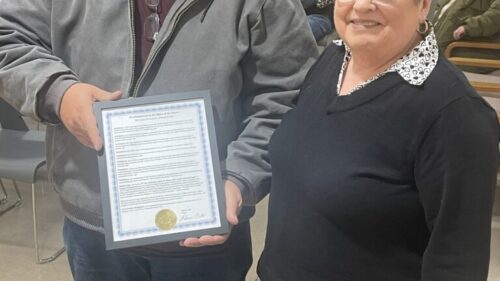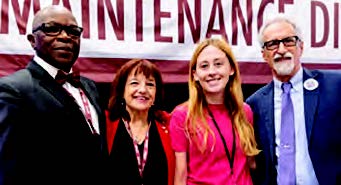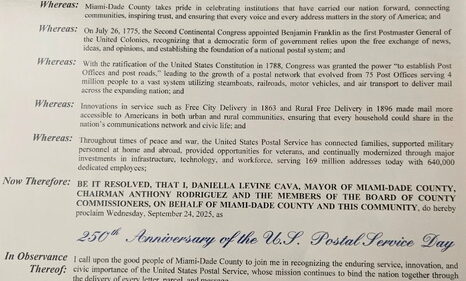APWU
Support Services All-Craft 2025
(This article appeared in the November/December 2025 issue of The American Postal Worker magazine) The Support Services Division 2025 All-Craft training consisted of information on building the labor movement, grievance writing, a solidarity action with Amazon worker Lauri Masterson, who is organizing a union in her workplace, and craft breakout sessions over three days. Support […]
The post Support Services All-Craft 2025 appeared first on American Postal Workers Union.

Dupont Pennsylvania Signs Proclamation Honoring USPS 250
The Pennsylvania Postal Workers Union (PPWU) is one of the latest APWU offices to announce that they have procured a signed proclamation. Mayor Elaine Lello, from the Borough of Dupont, PA, signed the proclamation on Oct. 14 and presented it to the PPWU on Nov. 11. The Dupont proclamation honors 250 years of the USPS […]
The post Dupont Pennsylvania Signs Proclamation Honoring USPS 250 appeared first on American Postal Workers Union.

Successful Maintenance Craft Conference in 2025
(This article appeared in the November/December 2025 issue of The American Postal Worker magazine) We successfully completed the 2025 APWU All-Craft Conference, held in Las Vegas, NV. The Saturday before the conference, we attended the Maintenance Council meetings. The conference itself took place on Monday, with Maintenance Regional Breakouts on Tuesday, and Maintenance Division workshops […]
The post Successful Maintenance Craft Conference in 2025 appeared first on American Postal Workers Union.
Protecting the Work
(This article appeared in the November/December 2025 issue of The American Postal Worker magazine) The 47th Motor Vehicle Service Director’s Conference commenced on Monday, Oct. 6. Motor Vehicle Service (MVS) officers, stewards, and members from across the country gathered to discuss, debate, and address the many issues faced by both the craft and the APWU. […]
The post Protecting the Work appeared first on American Postal Workers Union.
Dangerous New Trump Bill Threatens Veterans’ Health Care
(This article appeared in the November/December 2025 issue of The American Postal Worker magazine) The Senator Elizabeth Dole 21st Century Veterans Healthcare and Benefits Improvement Act is an amendment and another extension of Trump’s 2018 VA MISSION Act, and part of the Project 2025 plan to privatize the Department of Veterans’ Affairs’ (VA) provided health […]
The post Dangerous New Trump Bill Threatens Veterans’ Health Care appeared first on American Postal Workers Union.
Historic Settlement Reached on Time and Attendance Collection System Duties
(This article appeared in the November/December 2025 issue of The American Postal Worker magazine) On Sept. 30, Clerk Division Director Lamont Brooks reached an agreement with the Postal Service regarding Time and Attendance Collection System (TACS) duties. “TACS entries and TACS allied duties are clerk craft bargaining unit work in all Postal facilities/installations Level 18 […]
The post Historic Settlement Reached on Time and Attendance Collection System Duties appeared first on American Postal Workers Union.

Momentum Is Building in the APWU Proclamation Campaign, See Local Wins!
This year marks the 250th anniversary of the United States Postal Service, and momentum is building across the country to protect our public Postal Service! APWU Members are securing official proclamations and resolutions from their mayors, city councils, and county commissions, sending a clear message that the U.S. Mail is not for sale! How Did They […]
The post Momentum Is Building in the APWU Proclamation Campaign, See Local Wins! appeared first on American Postal Workers Union.
Thank You, Happy Holidays, and Looking to the Future
(This article appeared in the November/December 2025 issue of The American Postal Worker magazine) First, I want to thank the members of the APWU Northeast Region for your continued support and confidence in me during the 2025 APWU Election of National Officers, which allowed me to continue representing you as your Northeast Region Coordinator. It […]
The post Thank You, Happy Holidays, and Looking to the Future appeared first on American Postal Workers Union.
Implementation of Pay Provisions for the 2024-2027 Collective Bargaining Agreement
(This article appeared in the November/December 2025 issue of The American Postal Worker magazine) Happy Holidays to all of you! No matter if you are celebrating Hanukkah, Christmas, or Kwanza, I hope you all have a wonderful holiday season! Historically, this is the busiest time of year for the Postal Service. The work that all […]
The post Implementation of Pay Provisions for the 2024-2027 Collective Bargaining Agreement appeared first on American Postal Workers Union.
Spending Local Funds on Holiday Gift Cards Appropriately
The holiday season always brings inquiries from local and state officers who contemplate distributing gift cards to their members. While there is no prohibition against spending local funds on gift cardsfor the membership, there are considerations to be made by local officers when making or consideringmotions to expend union funds. The non-profit status of labor […]
The post Spending Local Funds on Holiday Gift Cards Appropriately appeared first on American Postal Workers Union.
